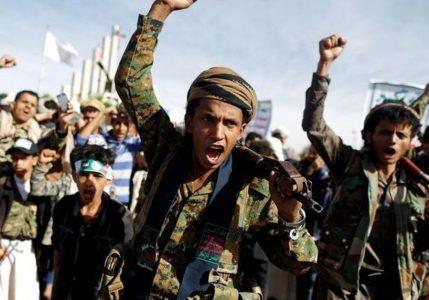
Yemen’s Houthi rebels begin raising funds for cash-strapped Hezbollah
A radio station broadcasting in support of the Houthi rebels in war-torn Yemen has launched a fundraising campaign for Lebanon’s Hezbollah which is facing increasing financial pressure from American sanctions on Iran.
The radio station, SAM FM, called on its listeners on Friday to “support the masters of the mujahideen in this world, the purest people, Hezbollah,” and to donate to the “From Yemen the Faithful to the Resistance of Lebanon” campaign during the final 10 days of Ramadan.
A report in The National reported that SAM FM Broadcaster Hamoud Mohammad Sharaf told the Houthi-run Saba news as saying that his station’s fundraising efforts for Hezbollah would “have a significant impact in strengthening the Axis of Resistance” in reference to groups like Hezbollah and Hamas.
According to a Twitter post by Fatima Abo Alasrar, a senior analyst for the Arabia Foundation, they were able to raise $120,000 from the campaign in the past month alone.
Yemeni activist Summer Nasser, who has previously testified before the UN Human Rights Council in Geneva about Yemen’s humanitarian crisis, the amount of money raised by the campaign can help thousands of Yemenis in terms of food or health care.
“That amount can help 2000 families (14,000 individuals) for one month of food security,” she tweeted. “That amount can establish 2 medical centers. That amount can create a community agricultural project.”
Yemen has been gripped by violence since September 2014, when the Houthi rebels stormed the capital of Sanaa and forced the internationally recognized government to flee south.
The Saudi-led coalition began bombing raids on Houthi positions across Yemen in March 2015 in support of Yemeni President Abd Rabbu Mansour Hadi and has since been accused of bombing schools, markets, hospitals and other civilian targets.
According to data collected by Armed Conflict Location & Event Data Project (ACLED), more than 70,000 people have been killed since 2016. Hundreds of thousands of others have been injured. UNICEF has confirmed that at least 7,300 children have been killed or seriously injured in Yemen since March 2015.
The Houthis, which have various homegrown missiles, including the Qaher-1, which has a range of 500 km. and the Borkan-1, have launched several ballistic missiles into Saudi Arabia as well as suicide drones.
The spokesman for the Saudi coalition, Col. Turki al-Maliki, was quoted as saying Monday by the London-based Asharq Al-Awsat that Saudi Arabia’s security is “a redline and those involved in terrorist acts will not escape punishment.”
According to the report, Maliki said that Tehran has supplied Hezbollah with Fateh-110 missiles and supplied the Houthis with drones.
“Evidence on the involvement of Iranian Revolutionary Guards (IRGC) will be revealed in a suitable time,” he was quoted as saying.
Tehran is believed to have sent Hezbollah militants to the war-torn country to train the rebels, and last August, a Saudi-led military coalition airstrike killed two Hezbollah “military experts” west of Sanaa in the district of Marib.
Last year, a delegation of Houthi rebels led by the group’s spokesman Mohamad Abdelsalam met with Hezbollah Secretary-General Hassan Nasrallah in Lebanon to discuss the latest developments of Yemen’s civil war.
While Israel believes that Iran has begun to build missile factories in the Yemen, Tehran denies interfering in Yemen despite their support for the Houthi rebels.
Israeli officials have said that Iran is providing funding to the IRGC’s Quds Forces in Syria, Hezbollah, Shi’ite militias in Iraq and Houthi militias in Yemen as well as Hamas and Islamic Jihad in Gaza at a cost of $2.5 billion a year.
But due to the latest round of American sanctions targeting Iran’s oil revenue, Hezbollah is concerned that their annual income from Tehran, around $700 million, will stop. Nasrallah has appealed for donations, setting up a foundation called “Support for the Resistance” and the group has begun cutting the salaries of its fighters.
Source: JP





